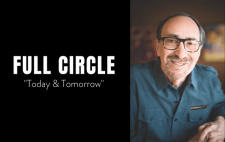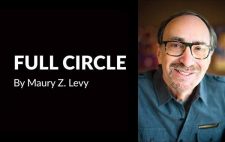Everything I ever knew about women I learned from the two most important men in my life. My father and Hugh Hefner.
I was 13 years old, just bar mitzvahed two weeks earlier, when my father and I had The Talk. “Rosie,” my father said as he gave my mother the nod that made her stop watching Perry Como and go directly upstairs. This had to be important, I thought. My mother missing Perry Como was like my father throwing out a cigar before it had burned his lips.
“Where are you going?” I asked.
“Your father wants to talk to you,” she said.
Uh-oh, this can’t be good. My father hadn’t “talked” to me since I threw a hardball though the kitchen window while he was eating herring. In my house, you just didn’t waste herring.
He was not good at these talks, my father. Not happy to have them. They interrupted his naps. This time, he fumbled, he bumbled, he stumbled. More than usual. He looked down at his shoes and never made eye contact.
“Maur,” he said. He called me Maur when he liked me or he needed help. “You’re going into high school now, and you’re going to start learning about girls.”
Learning? What did he think I’d been doing in my room for the past two years? Practice. We’re talking about practice.
“Look,” he said, “just be careful, and don’t do anything stupid.” And then he lit up a cigar. That was it. That was The Talk.
As I walked away, my head spinning with all this new insight, he cleared his throat.
“One more thing,” he said, looking at his shoes again. “I expect you to only date Jewish girls. It would break your grandfather’s heart if you didn’t.”
I loved my grandfather. But he was an Orthodox Jew who felt a woman’s place was in the balcony of the synagogue. My father was a Conservative Jew who thought a woman’s place was in the kitchen.
And then, making sure my mother couldn’t hear him, my father lowered his voice and put his hand on my shoulder.
“Listen,” he mumbled, “it’s OK to practice on shiksas.”
Later that year, my father was edged out for the Nobel Peace Prize by Mother Teresa who, ironically, was a shiksa.
Who said only Jewish mothers could lay guilt trips. That night I had a horrible dream. I was talking to Mary Lou Sheehy, the prettiest non-Jewish girl in my class, and my grandfather walked in wearing a prayer shawl. And, as soon as he saw us, he had a heart attack and died. And his body fell on Mary Lou Sheehy, and she was crushed to death.
At Lincoln High, you could count the pretty Jewish girls on one hand. And still have two fingers left for bowling. But a boy could dream. Like most American males in their early teens, the inspiration for those dreams came from a magazine. Playboy. My favorite Playmate was Avis Kimble. She had something the girls I knew didn’t have. Well, two things to be exact.
Back then, working at Playboy was my goal in life. My father didn’t live long enough to see me achieve it. To see me at the Mansion. To see me meeting with Hugh Hefner. To watch me talk to shiksas.
I would eventually take my father’s advice and marry a girl who was Jewish. Not because she was Jewish. Because she was very pretty, very smart and really loved sports.
Even though it was a mixed marriage (I was from Mayfair, she was from Oxford Circle), it got the approval of my family. At our engagement party, my father wore a blue suit and a big grin.
He took the cigar out of his mouth and slapped me on the back. “That’s a good girl you got there,” he said, “a real keeper. Can she cook?”
“Not really,” I said.
“Hmm,” he said. “Are you sure she’s Jewish?”












